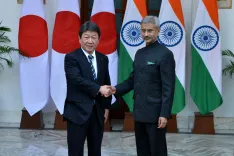Should Rights Be 'Unfairly Violated'? South Korea Reacts to US Raid on Hyundai-LG Plant

Synopsis
Key Takeaways
- South Korea expresses concern over U.S. immigration raid.
- 450 workers detained, including over 30 South Koreans.
- Government emphasizes protection of individual rights.
- Legal teams are being formed to assist detainees.
- This could impact international business relations.
Seoul, Sep 5 (NationPress) South Korea expressed deep concern and regret on Friday regarding a significant raid conducted by U.S. immigration officials at a battery plant construction site operated by South Korean firms. The government emphasized that the rights of individuals must not be unjustly violated.
The Ministry of Foreign Affairs released this statement following the detention of approximately 450 workers, including over 30 South Koreans, at a facility managed by Hyundai Motor Group and LG Energy Solution Ltd. in Georgia on Thursday (local time).
According to local media reports, U.S. authorities indicated that this operation was part of a broader investigation into undocumented workers, as reported by the Yonhap news agency.
“The economic activities of our companies investing in the U.S. and the rights and interests of our nationals must not be unfairly infringed upon,” stated ministry spokesperson Lee Jae-woong during a press briefing.
Lee also mentioned, “We communicated our concerns and regrets through the U.S. Embassy in Seoul today.”
In response to the situation, Seoul dispatched embassy and consular officials to Washington and Atlanta and directed local diplomatic missions to establish an on-site task force to address the issue, as confirmed by the ministry.
Previously, the U.S. Immigration and Customs Enforcement, along with Homeland Security Investigations, sent agents to the construction site for the electric vehicle (EV) battery production facility in Ellabell, situated in Bryan County, west of Savannah, to execute a search warrant, according to local media reports.
The operation resulted in the detention of about 450 individuals, including more than 30 South Koreans who were in the U.S. for business purposes. They now face potential charges related to illegal residence, as reported by immigration authorities.
The South Koreans arrived on a B1 visa designated for business activities, such as attending meetings or signing contracts, or through the Electronic System for Travel Authorization (ESTA) visa waiver program for short-term visits.
In response to these developments, the South Korean consulate in Atlanta is assembling a legal team that includes Korean American lawyers, with plans to visit the facility where the detained workers are held, according to a consulate official.









